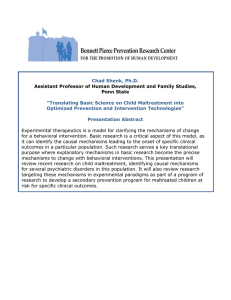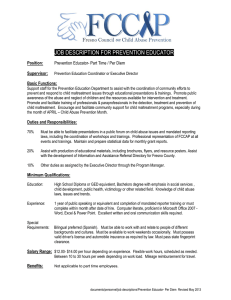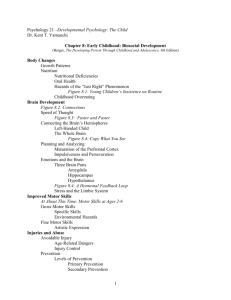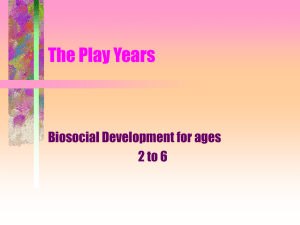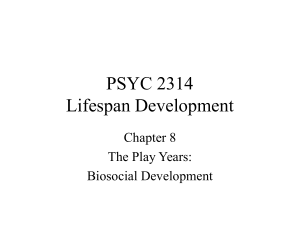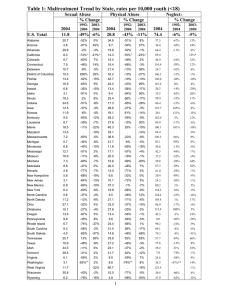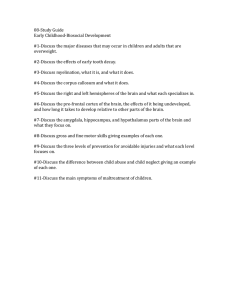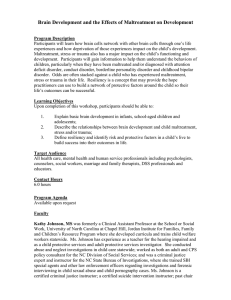PROPOSAL FOR CHILD ADVOCACY STUDIES CERTIFICATE AT KENNESAW STATE UNIVERSITY
advertisement
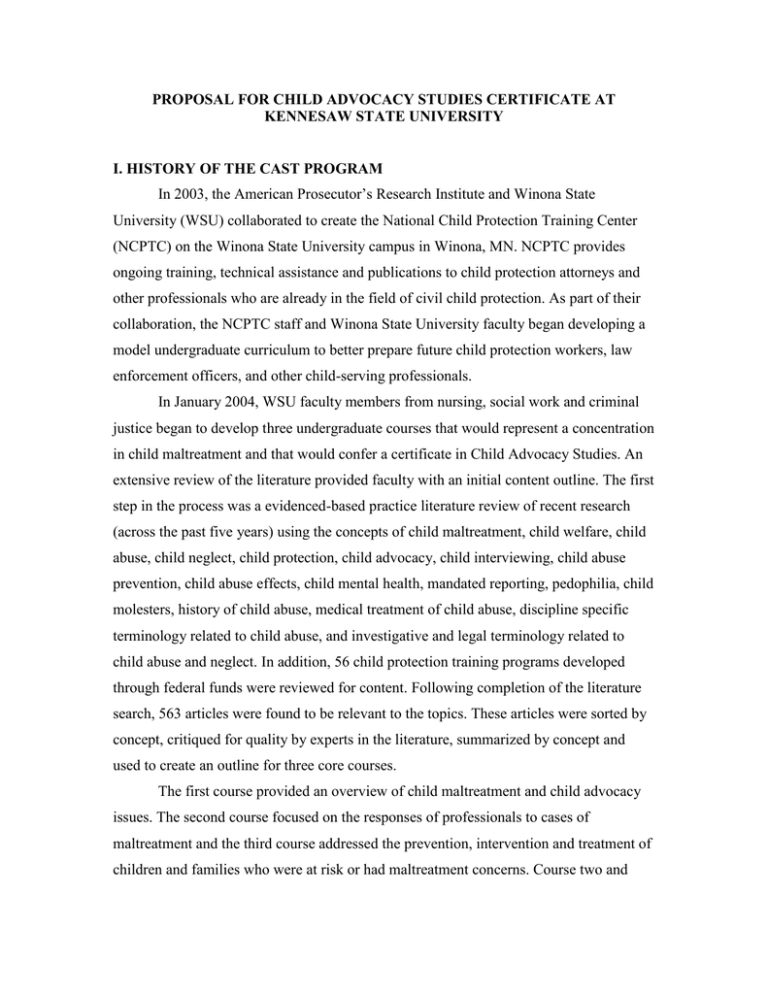
PROPOSAL FOR CHILD ADVOCACY STUDIES CERTIFICATE AT KENNESAW STATE UNIVERSITY I. HISTORY OF THE CAST PROGRAM In 2003, the American Prosecutor’s Research Institute and Winona State University (WSU) collaborated to create the National Child Protection Training Center (NCPTC) on the Winona State University campus in Winona, MN. NCPTC provides ongoing training, technical assistance and publications to child protection attorneys and other professionals who are already in the field of civil child protection. As part of their collaboration, the NCPTC staff and Winona State University faculty began developing a model undergraduate curriculum to better prepare future child protection workers, law enforcement officers, and other child-serving professionals. In January 2004, WSU faculty members from nursing, social work and criminal justice began to develop three undergraduate courses that would represent a concentration in child maltreatment and that would confer a certificate in Child Advocacy Studies. An extensive review of the literature provided faculty with an initial content outline. The first step in the process was a evidenced-based practice literature review of recent research (across the past five years) using the concepts of child maltreatment, child welfare, child abuse, child neglect, child protection, child advocacy, child interviewing, child abuse prevention, child abuse effects, child mental health, mandated reporting, pedophilia, child molesters, history of child abuse, medical treatment of child abuse, discipline specific terminology related to child abuse, and investigative and legal terminology related to child abuse and neglect. In addition, 56 child protection training programs developed through federal funds were reviewed for content. Following completion of the literature search, 563 articles were found to be relevant to the topics. These articles were sorted by concept, critiqued for quality by experts in the literature, summarized by concept and used to create an outline for three core courses. The first course provided an overview of child maltreatment and child advocacy issues. The second course focused on the responses of professionals to cases of maltreatment and the third course addressed the prevention, intervention and treatment of children and families who were at risk or had maltreatment concerns. Course two and three included a two hour lab every week that would provide students with experiences in child protection such as forensic interviewing, interviews with families, in-court experience, mock trials, and interdisciplinary team building, etc. In addition to the experiential lab component, each course included content in child advocacy, domestic violence, chemical dependency, ethnic and cultural issues, and ethics. These are pervasive concepts within the curriculum. In April 2004, a draft of the three child advocacy courses was presented to two groups of Minnesota community professionals. These focus groups included individuals from law enforcement, the district attorney’s office, social services, public health nursing, physicians from Mayo Clinic, pediatric nurse practitioners, Rochester Technical and Community College Deans, and other persons who would be interested in the education that professionals working with children would receive or who may have expertise in this area. Their response was very positive and their suggestions were incorporated into the evolving curriculum. In May-November, 2004 the courses were updated and the first course was offered spring semester, 2005. The majority of students were from nursing and social work. All students enrolled in the courses sign a consent form agreeing to be involved in prospective evaluation research that includes: a pre and post evaluation for each course, student evaluations following each course, program evaluation following completion of the certificate courses, follow-up of graduates at 1, 3, and 5 years to evaluate the program content and effectiveness of the program, follow-up with graduate employers at 1, 3, and 5 years to evaluate the content and effectiveness of the program, a videotape pre and post test of a forensic interviewing case study and evaluations of faculty. The evaluations have demonstrated that student satisfaction with the content, methods of teaching and the ability to prepare them for child protection work is at 97%. Overall knowledge in each course improved immensely. Through the efforts of the NCPTC, the CAST curriculum has received national attention. To date, approximately 10 universities are actively pursuing adoption of the CAST certificate program at their university. In addition, WSU faculty members have received approximately 50 requests for information about the CAST curriculum. In summer 2009, Kennesaw State University Department of Social Work and Human Services was one of only 20 universities from 15 different states to have faculty members invited to participate in a Child Advocacy Studies (CAST) conference at Winona State. The Department was the only department from Georgia to be invited to participate in the conference. The universities invited to the conference saw, first-hand, how successful professional training of both bachelor and master level students from different disciplines can result in the development of knowledgeable professionals who can competently manage child abuse and maltreatment cases. Following the meeting at Winona State, The Department determined that offering a Child Advocacy Studies Certificate Program would be appropriate for both undergraduate human services majors and graduate MSW students. In fact, a Certificate Program would enhance the marketability of students and develop a workforce that will be better prepared to address the complex issues involved in child maltreatment. As well, the Certificate Program could also be open to staff from the Georgia Department of Family and Children Services, the Children’s Advocacy Centers of Georgia, and staff from other agencies in the Atlanta area. Departmental administrators and faculty were excited about offering a Certificate Program beginning summer 2012. While the Certificate Program at Winona is interdisciplinary to include criminal justice, social work, psychology and nursing, the Department determined that we would initially start with undergraduate human service and MSW students. We would then like to offer the curriculum to staff from the Children’s Advocacy Centers of Georgia, Department of Families and Children, as well as staff from other interested agencies in the Atlanta area. The Program would expand to include other departments (education, psychology, criminal justice, nursing), as appropriate. II. OVERVIEW OF THE CAST CURRICULUM The focus of the Child Advocacy Studies curriculum is on experiential, interdisciplinary, ethical and culturally sensitive content that would provide professionals working with children a common knowledge base for responding to child maltreatment. This program focuses on developing students’ understanding of the numerous factors that lead to child maltreatment, and of existing responses to incidents of child maltreatment, in order that they may work more effectively within systems and institutions that respond to these incidents. Students will learn about the various disciplinary responses to child maltreatment, and will develop a multi-disciplinary understanding of the most effective responses. Students completing the courses in this program will be better equipped to carry out the work of agencies and systems (health care, criminal justice, social services) as they advocate on behalf of the needs of children as victims and survivors of child abuse. The Certificate Program would offer four courses: (1) Social Work Forensics; (2) Perspectives on Child Maltreatment; (3) Professional and System Responses to Child Maltreatment; and (4) Elective. These four courses would be dispersed throughout the year. Human Services (HS) majors would be able to take the courses as part of their concentration electives and Master of Social Work (MSW) majors would be able to take the courses as electives during their advanced year. III. PROFESSIONAL NEED FOR CAST “Unto the Third Generation: A Call to End Child Abuse in the United States within 120 Years” by Victor I. Vieth (2006), provides a blueprint for a plan to educate child protection professionals for the 21st Century. Vieth proposes that universities must be the “keepers” of the plan to educate front line professionals and describes the obstacles the nation faces in ending child abuse. Many cases of suspected child abuse are not being reported by professionals. A study published in 2000 found that 65% of social workers, 53% of physicians and 58% of physician assistants were not reporting all cases of suspected abuse (Delaronde et al., 2000). Even when cases are reported, many professionals are not adequately trained to manage the cases. Universities seldom prepare students for the reality of child protection. Social workers, nurses, law enforcement professionals receive between two hours to two weeks of information about child protection before beginning their professional careers. Professional education in child maltreatment is fragmented and spread out in a variety of courses with little practical information about actual child maltreatment. WSU is the only institution that has an interdisciplinary child protection curriculum designed for students in a career as a front line child protection professional. The reason the NDAA partnered with WSU in designing the curriculum is that thousands of child protection professionals in the field are demanding that undergrad institutions do a better job of preparing child protection professionals. This is further reflected by the fact that dozens of universities have contacted either WSU or NDAA about implementing the CAST curriculum at their institution. A number of these communities including; Fayetteville, NC, Omaha, NE, Springfield, MO and Little Rock, AR have flown the Director of The NCPTC to their communities to learn more about the CAST curriculum. Existing curricula in child protection largely exists only at the graduate level, even then existing curriculum is primarily theoretical. The Child Advocacy Studies curricula at WSU brings academia into the street by teaching students pertinent child protection literature and then requiring students to demonstrate their skills in experiential exercises. WSU is the first academic institution to also instruct a laboratory for these classes. To include: court rooms, forensic interview rooms, and a “house” in which to conduct child protection exercises. Successful professional training will produce child maltreatment professionals who will be knowledgeable enough to competently manage child maltreatment cases. “We simply must produce, beginning in college, an army of front line workers well equipped to organize all the players in their local communities for the betterment of children” (Vieth, 2006). The most compelling reason to provide training experiences to front line child professionals is because experiences interviewing, on a witness stand, conducting a home visit, and planning case management increases professional competency and may prevent a child maltreatment case from being mishandled or overlooked. In a 2006 study, 1416 college and university websites were searched using the terms “child maltreatment,” “child abuse and neglect,” “child protection,” “child welfare” and “child advocacy” (Hatlevig, 2006). Baccalaureate degrees were offered in criminal justice/law enforcement (393), education/other (105), nursing (390), social work (340), Sociology (639), psychology (794), human services (113), and medicine (96). Only 410 colleges/universities or 29% had coursework containing the terms child maltreatment, child abuse and/or neglect, child welfare, or child advocacy when searched. Approximately 19 courses were offered that focused on child maltreatment. Although further analysis of the data is needed, the author concluded that post-secondary courses and programs related to child maltreatment appear to be quite limited. Much of the coursework is offered in disciplines such as psychology and sociology that are not training the majority of front-line professionals. In addition, no concentrations, majors or minors focusing on child maltreatment could be found. Professionals who wish to specialize in child protection are hard pressed to find coursework that will train them to be competent in their profession. Most MSW programs, including the MSW program at Kennesaw State University, focus on treatment of children so that graduates are able to work in a number of diverse agencies. This certificate program will provide specialized training focusing on child abuse and child maltreatment. CERTIFICATION Students who complete all three courses offered in the discipline receive a certificate of completion from Kennesaw State University. CERTIFICATION REQUIRED COURSES (12 credit hours total) Child Advocacy Studies (CAST) HS4430/SW8820 Social Work Forensics HS4450/SW8821 Perspectives on Child Maltreatment & Child Advocacy HS4460/SW8822 Professional and System Responses to Child Maltreatment Elective* COURSE DESCRIPTIONS HS 4430/SW8820 – Social Work Forensics – 3 credit hours (required) This course provides an overview of the interplay between human service professionals and the court systems. It will also focus on forensic social work practice and theory. Additionally, it illustrates skills for working with diverse populations across the lifespan and across diverse settings, such as community, medical, school, child welfare, mental health and addictions, and juvenile and criminal justice settings. Prerequisites for HS Majors: HS3300 or permission of the department. HS4450/SW8821- Perspectives on Child Maltreatment & Child Advocacy—3 credit hours (required) This is the second course for child advocacy studies. This course covers the history, comparative perspectives, legal framework and responses to child maltreatment. It also discusses the skills necessary to work in the field and other pertinent issues pertaining to child maltreatment and child advocacy. The field of child maltreatment is fraught with controversy. Much of the class focuses on these controversies. The approach of the course will be from a variety of diverse, professional perspectives including the perspectives of a prosecuting attorney versus a defense attorney. The course is designed for students majoring in human services, criminal justice, education, social work, sociology, psychology, nursing, or other areas where knowledge of child maltreatment and advocating for children might be necessary. Much of the work will be hands-on. Prerequisite include HS4430/SW8820 (Social Work Forensics). HS4460/SW8822 - Professional & System Responses to Child Maltreatment—3 credit hours (required) This is the third course for the child advocacy studies and focuses on the responses of professionals to allegations of child maltreatment. The purpose of this course is to prepare students to identify and investigate child maltreatment and apply intervention strategies for children and their families including prosecution where indicated. The class will discuss issues related to child witnesses such as recantation, suggestibility, memory and the impact of multiple interviews on children. Role plays and case studies will be used in the course. HS 4430/SW8820 and HS4450/SW8821 are prerequisites. Students taking this course for graduate credit will be expected to complete an additional assignment. Elective – 3 credit hours Undergraduate students may select from the following concentration electives: HS4415 Child Welfare HS4420 Family Violence Graduate students may select from the following electives: SW8725 Social Work Practice with Domestic Violence SW8812 Clinical Practice with Abused and Neglected Children and their Families: Child Protective Services
